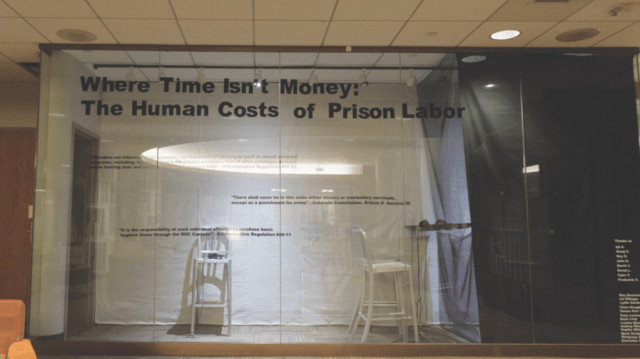Students at Colorado College have put up an art exhibition on campus that examines the human cost of exploitative prison labor in the United States.
It is being organized by the Colorado College Prison Project, which says its mission is to promote “prison reform advocacy and education on our campus. We believe that every person is complicit in the injustices of incarceration, so we must utilize our power and resources to make change in our community.”
As part of the exhibit, visitors can listen to accounts from formerly incarcerated individuals in the Colorado prison system and learn how many common items — from cheese to building materials — are actually made with forced prison labor.
The Catalyst reports:
“Not only are inmates required to work—in fact, they are punished if they do not—but prisons operate with the expectation that inmates will be able to purchase products in the commissary (prison store),” said Clara Houghteling ‘18. “They are not given toiletries or adequate food because they are supposed to buy their snacks and hygiene products themselves.
This level of self-sufficiency is nearly impossible on a wage of $0.84 per day or less. To make matters worse, low wages mean that incarcerated people often have no savings upon release, yet they are expected to pay for treatment programs and restitution right away.
Since most prison jobs focus on keeping inmates busy rather than teaching them marketable skills, formerly incarcerated people tend to struggle to find work on the outside. Exploitative prison labor thus makes life difficult both in prison and on the outside, contributing to pernicious cycles of recidivism.”
Students who have seen the exhibit said they were shocked by the injustices happening in the American prison system.
“I found the exhibit to be very eye-opening with how it gave a voice to people I would never have heard from otherwise,” said student Jenny Ross. “I will definitely be reevaluating how I contribute to the pain these individuals go through.”







Freedom United is interested in hearing from our community and welcomes relevant, informed comments, advice, and insights that advance the conversation around our campaigns and advocacy. We value inclusivity and respect within our community. To be approved, your comments should be civil.